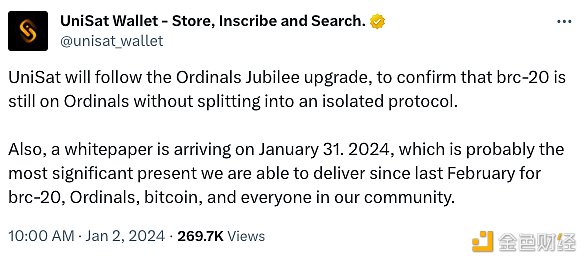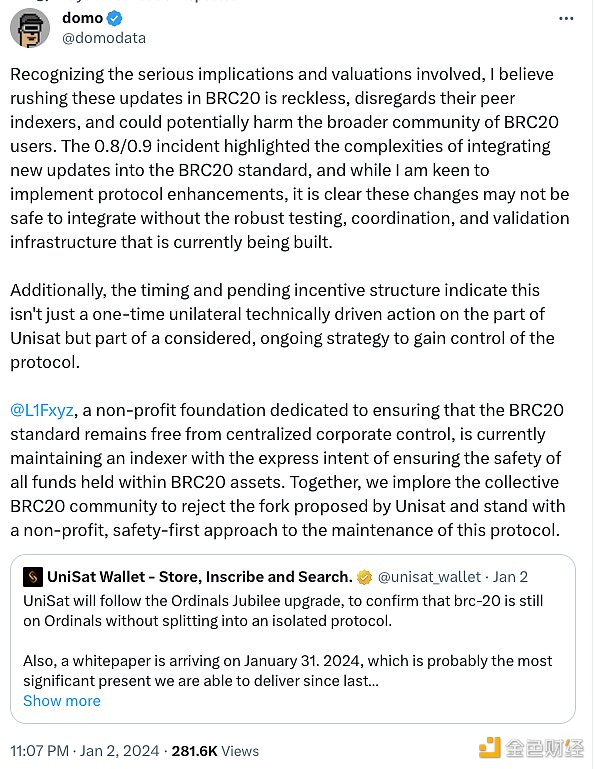Written by: 0xxz@金财经
2024 has just begun. Will the BRC20, which was so successful in 2023, fork?
What happened
On January 2, 2024, UniSat announced that it would follow the Ordinals Jubilee upgrade to confirm that brc-20 was still on Ordinals and not split into isolated protocols . Additionally, the white paper will be released on January 31, 2024, which may be the most important gift we can provide to brc-20, Ordinals, Bitcoin, and everyone in the community since last February.

Founder of Ordinals Protocol Domo immediately tweeted that Unisat's rush to implement these updates is reckless, ignores its peer indexers, and may harm the broader BRC20 user community. He further accused this of being part of Unisat’s deliberate and ongoing strategy to gain control of the protocol, and implored the BRC20 community to collectively reject the fork proposed by Unisat.

Aware of the severe implications and valuations involved, I believe it would be reckless to rush through these updates in BRC20 and ignore them peer indexersand may harm the broader BRC20 user community. The 0.8/0.9 incident highlighted the complexity of integrating new updates into the BRC20 standard, and while I was enthusiastic about implementing protocol enhancements, it became clear that these changes might not be integrated securely without a robust testing, coordination and validation infrastructure. Currently under construction. Furthermore, the timing and pending incentive structure suggest that this is not just a one-time, unilateral technology-driven action by Unisat, but rather a deliberate, ongoing part of a strategy aimed at gaining control of the protocol.
L1 Foundation is a company dedicated to ensuring the BRC20 standard A non-profit foundation not controlled by a centralized company, ObjectAn indexer is being maintained with the express purpose of ensuring the security of all funds held in BRC20 assets. We collectively plead with the BRC20 community to collectively reject Unisat’s proposed fork and support maintaining the protocol in a non-profit, security-first manner.
Ordinal market Bioniq CEO Bob Bodily issued a document calling it BRC20 indexer war,He also reviewed the background of the debate between Unisat and domo and expressed his personal views:
BRC20 Indexer War: What is the key to the debate
First, a quick summary of BRC-20:
BRC-20 is by far the most successful FT token on Bitcoin coin protocol. Transaction volume last year was in the hundreds of millions, if not billions. It's not perfect (uses inefficient encoding, bloats the UTXO set, and currently has limited functionality), but it's incredibly easy to deploy and mint tokens, and has inspired inscriptions across the crypto world on nearly every chain.
Secondly, a quick introduction to technology:
BRC-20 is a meta-protocol built on the Ordinals meta-protocol, which in turn is built on Bitcoin . This means that Ordinals use Bitcoin as a full data availability layer and an off-chain indexer to determine the meta-protocol state. BRC-20 uses the Ordinals protocol as a complete data availability layer with an off-chain indexer to determine meta-protocol status. This means that BRC-20 is actually a meta-meta protocol because it is built on top of Ordinals.
The complexity of building BRC-20 on Ord:
The Ordinals protocol technical specifications have been changing over the last year. Ord is a completely new protocol, so it has changed a lot. When you build a token standard on top of Ord, your protocol adds additional risk because you have a transfer protocol as a dependency. This is what happened with Ord 0.8.0 and Ord 0.9.0. Different versions of Ord track inscriptions slightly differently, meaning the BRC-20 indexer will report incorrect balances depending on whether they are built on 0.8.0 and 0.9.0. Of course, this is undesirable.
L1 Foundation Solution
Layer 1 Foundation (L1F , Ordinals protocol founder domo is one of the founders of L1F) The solution is to freeze the Ord protocol version to 0.9.0 to prevent similar problems from occurring in the future. Therefore, even though we have other categories of Cursed Inscriptions, the Cursed Inscriptions were caused by a BUG before the Ordinals protocol, resulting in some inscriptions not being recognized by the indexer, so the Ordinals team decided to include these Cursed Inscriptions Assigned as a negative value, counting down from 0, so it is also called negative inscription), By building all indexers on the 0.9.0 version, you Any cross-version incompatibilities can be avoided. This is not a permanent solution, but for now it works very well in keeping the BRC-20 stable.
Unisat hopes to push the protocol forward
First, Unisat launched a black and white module system. This allows people building on BRC-20 (like Unisat) to introduce new functionality in black modules (temporary locations that are not indexed in the main protocol). You can put coins into the black module, but you can't take them out until approved, essentially like a Bitcoin spacechain (one-way bridge). Then yesterday, Unisat announced that they wanted to upgrade the Ord version under the BRC-20 indexer to the latest version, Jubilee. Jubilee is the official version of Ord and will no longer have cursed inscriptions (all inscriptions will always have positive numbers).
Key point of debate: How to upgrade BRC-20
Upgrading the Ord version under the BRC-20 indexer is actually a very good idea . The Ord protocol will be more stable, we will no longer have curse inscriptions, and we will no longer have to worry about balance mismatches and other issues.
Unisat hopes to launch this protocol as soon as possible, which makes sense because Unisat is a startup. Startups don’t have time to sit around and wait. You have to work hard to find product market fit and build it for your users.
L1F would like to delay the upgrade because if we rush the upgrade, more bugs may occur. Best in slot and others have discovered some of these protocol bugs. This makes sense since L1F is designed to protect the foundation of the protocol, so they can accept upgrades from slower moving, more purposeful protocol paths.
Some believe this is a power play by the Unisat team to try to control the protocol. Others believe that L1F is simply trying to control the protocol, which should be more market-driven.
My opinion
Due to the incredible success of the BRC-20 agreement, we cannot move any faster. The start-up phase of BRC-20 is over. BRC-20 is an absolutely massive protocol (TVL, users, infrastructure, wallets, market) and nothing should be done quickly anymore. I like the way from L1F. Domo has always recognized the importance of protocol stability (BRC-20 has not really changed since its inception), which is a strength. Easier to integrate. Easier to build. etc. We need decentralized, thoughtful, and slow-moving consensus and compromise to drive changes to the BRC-20 protocol forward.
 JinseFinance
JinseFinance
 JinseFinance
JinseFinance JinseFinance
JinseFinance JinseFinance
JinseFinance JinseFinance
JinseFinance JinseFinance
JinseFinance Zoey
Zoey JinseFinance
JinseFinance JinseFinance
JinseFinance JinseFinance
JinseFinance Others
Others